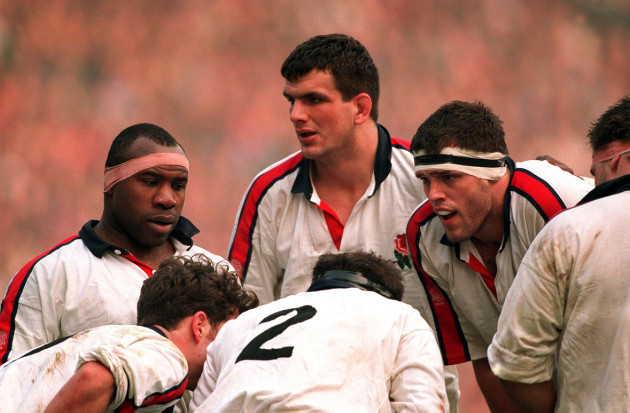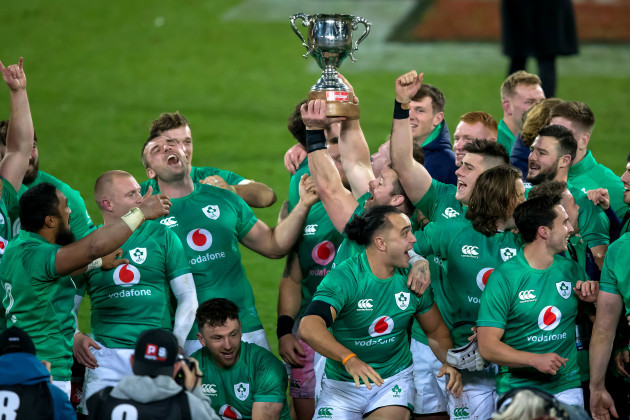IT STARTS with his name on a list. Queen Elizabeth’s was there too, also Margaret Thatcher’s. The name on top was John Major’s, the man calling the shots at No10 Downing Street. Yet on this day in 1993, it was a different No10 that Martin Bayfield was thinking more about, the new Irish outhalf, Eric Elwood.
The previous week he’d seen Elwood dictate the terms and conditions of Ireland’s Five Nations win over Wales and found something about this player, this team, this country deeply appealing.
Nothing was going to dissuade him from thinking that way, not even the security official who pulled him aside before he boarded the plane from Heathrow to Dublin to tell him he would be assigned an armed guard from the moment he landed in Dublin. Bayfield didn’t blink when told the IRA had a list of the top 200 members of the British Establishment they considered legitimate targets.
As an international rugby player – and a serving policeman – he was one of those targets, grouped with members of the Royal Family and Conservative Government. The only difference was neither Queen Elizabeth nor Major were needed by England for the 1993 Five Nations championship. But PC Bayfield was.
“If there were 200 on the list, then I was number 200,” the former England lock says now, three decades later.
“You see, I never felt any threat. There were no messages or random phonecalls. We just got on with things in blissful ignorance. If there was something going on, we weren’t aware of it. All we knew was that there was someone in the background protecting us. They were at the game too.
“That was at least until the post-game function when our armed guards got absolutely shit-faced. All I can say is that seeing your security detail drunk in charge of a firearm was not a reassuring sight.”
The only ambush that happened that spring day in 1993 was at Lansdowne Road. England, World Cup finalists in 1991, grand slam winners in ’91 and ’92, were expected to hammer Ireland because, well, that’s what everyone did back then.
Instead, everything came good, Mick Galwey scoring a memorable try, one that secured him a ticket with the Lions to New Zealand.
Nick Popplewell was on that tour, too.
And.
That.
Was.
It.
With just two of the 30-man squad from Ireland, it was little wonder that team were dubbed the British Lions. “Eh, lads, it is British and Irish,” Popplewell constantly reminded them, so much so that he got bumper stickers made up and distributed to the rest of the squad, Bayfield being one of them.
“Pops was brilliant, a quality player, and hated the fact we adopted him as an honorary Englishman on that tour,” Bayfield says.
“He put us right. Until 1993, on this side of the pond anyway, people referred to the team as British Lions. That was all I heard as a kid, all I’d ever read. So, Pops was the guy who really drove the message home. ‘We aren’t British Lions, we’re British and Irish’. He got it right, we had it wrong and had it wrong for so long.”
They weren’t the only ones who needed guidance. Way back then, the IRFU lacked the vision to get a competitive team on the park. Bayfield may have lost to them twice out of four meetings but that was an unusual occurrence because Ireland, in that decade, were a shambolic outfit.
Put it this way, no Scot, Frenchman, Kiwi, Wallaby, Springbok, Namibian or Samoan ever lost a Test to an Irish team in that decade.
“And I find that strange because Ireland had some bloody good players,” Bayfield says. “Some of them – Paddy Johns in particular – should have been on that 1993 Lions tour. Now I’m glad Paddy didn’t go because I probably wouldn’t have played in the Tests if he had.
“But Paddy is the sort of guy who would have been brilliant in New Zealand, so too Peter Clohessy. It’s wrong they weren’t there. New Zealand is a bloody hard place to go to. You need big players, big personalities to win there.”
That’s why he watched with deep admiration as Johnny Sexton led Ireland to glory over the All Blacks this summer, knowing the difficulties that have to be overcome to win in Dunedin and Wellington. “It didn’t surprise me,” he says.
You don’t expect him to think this way, not when you contextualise his background, a player from the 90s, an era when Ireland were the weakest Tier1 nation in world rugby, deprived of a plan either on the field or off it.
Now look at them. Grand Slam winners in 2009 and 2018, they’ve repeatedly broken new ground, winning away in Paris, South Africa, Australia, New Zealand having gone decades (France and Australia) or an entirety (Springboks and All Blacks) without a sniff of success over those teams on the road.
“I wouldn’t go so far as to say it was inevitable that Ireland would come good because you need good coaches and structures for it to work,” says Bayfield. “But when you look at the professional game now, it’s practically tailor made to suit Ireland more than anyone. Without Ireland realising it or planning for it, they have got the perfect structure to succeed.
“Think about it. Wales had to invent the regions, Scotland their Super Districts. Okay, England didn’t have to identify anything, as the clubs were already in existence, but there is neither rhyme nor reason as to where they are located.
“Since professionalism, some clubs have disappeared, your West Hartlepools, Coventrys, Richmonds. Worcester are in trouble now. But Leinster, Munster, Connacht, Ulster, they will never go bust.
“Irish rugby didn’t have to invent any teams, didn’t have to come up with any names. The teams were there. You had the rivalries. The system feeds players into those provinces, the academies function well.
“Add in some smart coaching appointments you’ve made at key times – Michael Cheika, Joe Schmidt, Leo Cullen and Stuart Lancaster with Leinster – (Warren) Gatland, (Eddie) O’Sullivan, (Declan) Kidney, Schmidt and Andy Farrell with Ireland.
“Ireland to me in the 2000s are like England in the late 80s in that they woke up and decided to get their act together.
“The one thing they’ve never done, of course, is get beyond a World Cup quarter-final, which is kind of staggering.
“That can change. They have to be up there with France as favourites to win a World Cup which is a tag no one in Ireland may want.”
Not only does no one in Ireland want that label, no one believes we deserve it. Hyped up in 2007, 2011, 2015 and especially in 2019, they underperformed. So why should 2023 be any different?
“What impresses me most about Andy Farrell’s set-up is the fact there has been no drop off from the Joe Schmidt era,” says Bayfield. “A lot of spectators wondered what he would be like as a head coach? Well, the answer is pretty bloody good.
“So, that’s my starting point. Now look at their results over the last 18 months. They’ve played New Zealand four times, won three. They’ve played England twice, won twice. They’ve lost just two out of 16 matches. They put 60 points on Japan, 50 on Argentina, 32 on England. They beat Scotland by Wales by over 20 points.
“To be able to win on tour is another box ticked. France, Ireland, New Zealand and South Africa are the top four teams for me. Two big teams will be gone by the quarters and while Ireland have some psychological hurdles to overcome, look at the stats. Why shouldn’t they be one of the favourites? The unexpected can happen.”
He only has to reflect on his own life to know that.
As a kid out of school, he knew he wanted to pursue two careers, one as a policeman; the other as a rugby player. The fact rugby was amateur suited him. Turning professional did not.
Suddenly, his status dipped. As a policeman, there was a routine to his week; a shared camaraderie in the force; an unspoken respect for what he did. “People say being a professional sportsman is a dream job but I didn’t like it. I was used to fitting rugby in around life as a police officer. When I left the force, I missed my colleagues, my friends. I found it disconcerting, destabilising and it threw me. I found rugby boring. The games were fine but the training was dull.”
In time he’d reinvent himself, become an actor, work in three Harry Potter films and become a broadcaster and now, as of last week, a published author. Ireland, he says, can become world champions.
A tall story?
We’ll find out a year from now.
- Martin Bayfield, A Very Tall Story, written with Gavin Mairs, publisher Simon & Schuster UK, is available in book stores.



